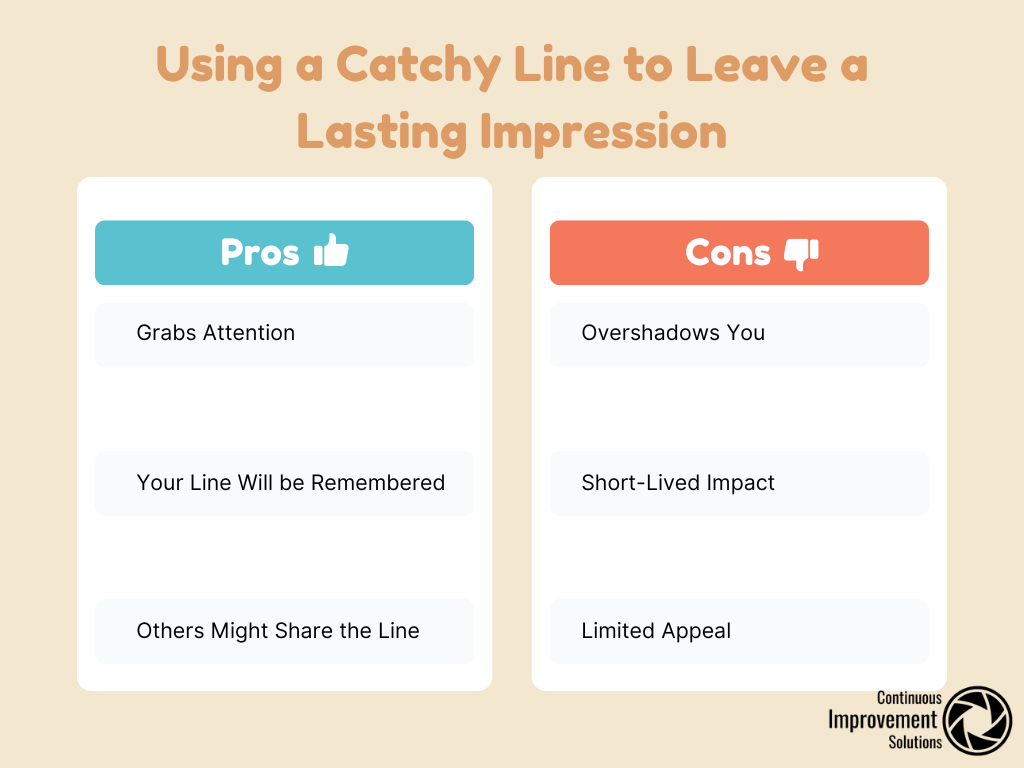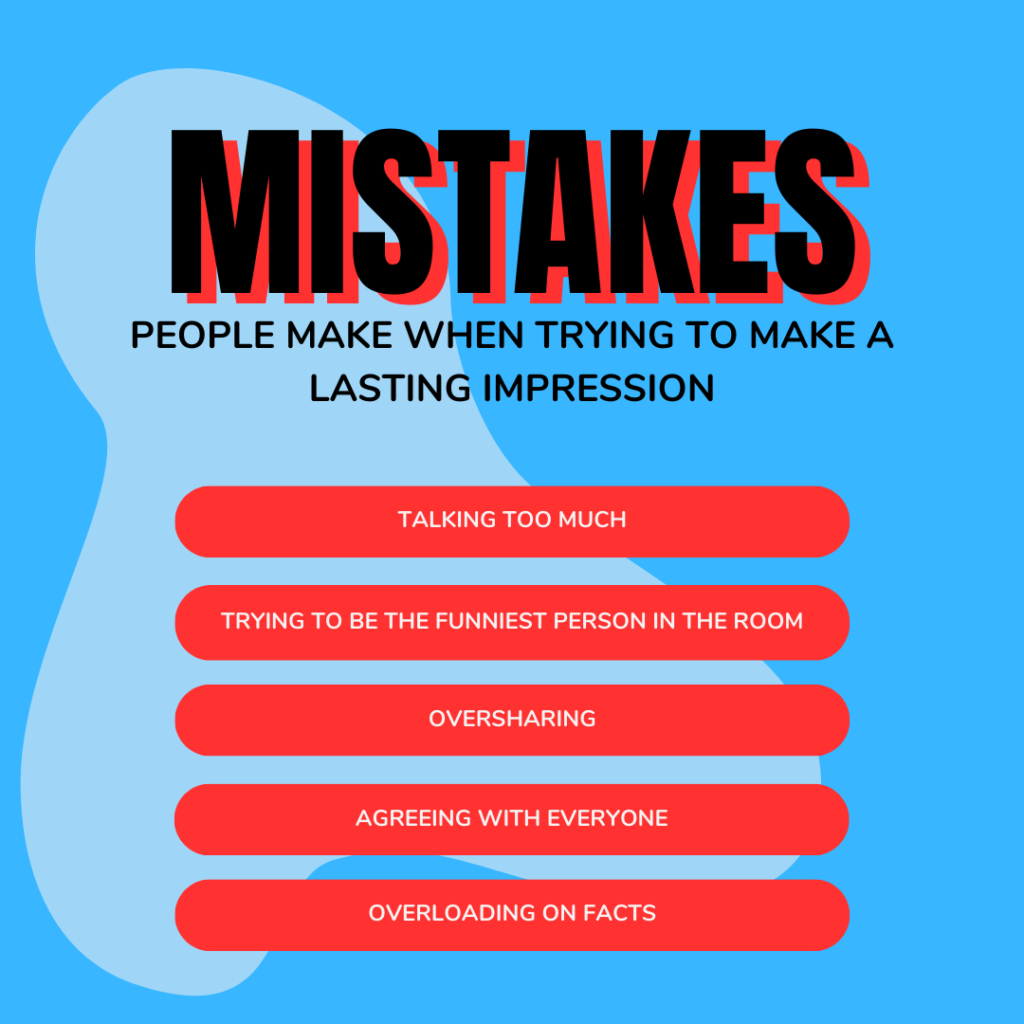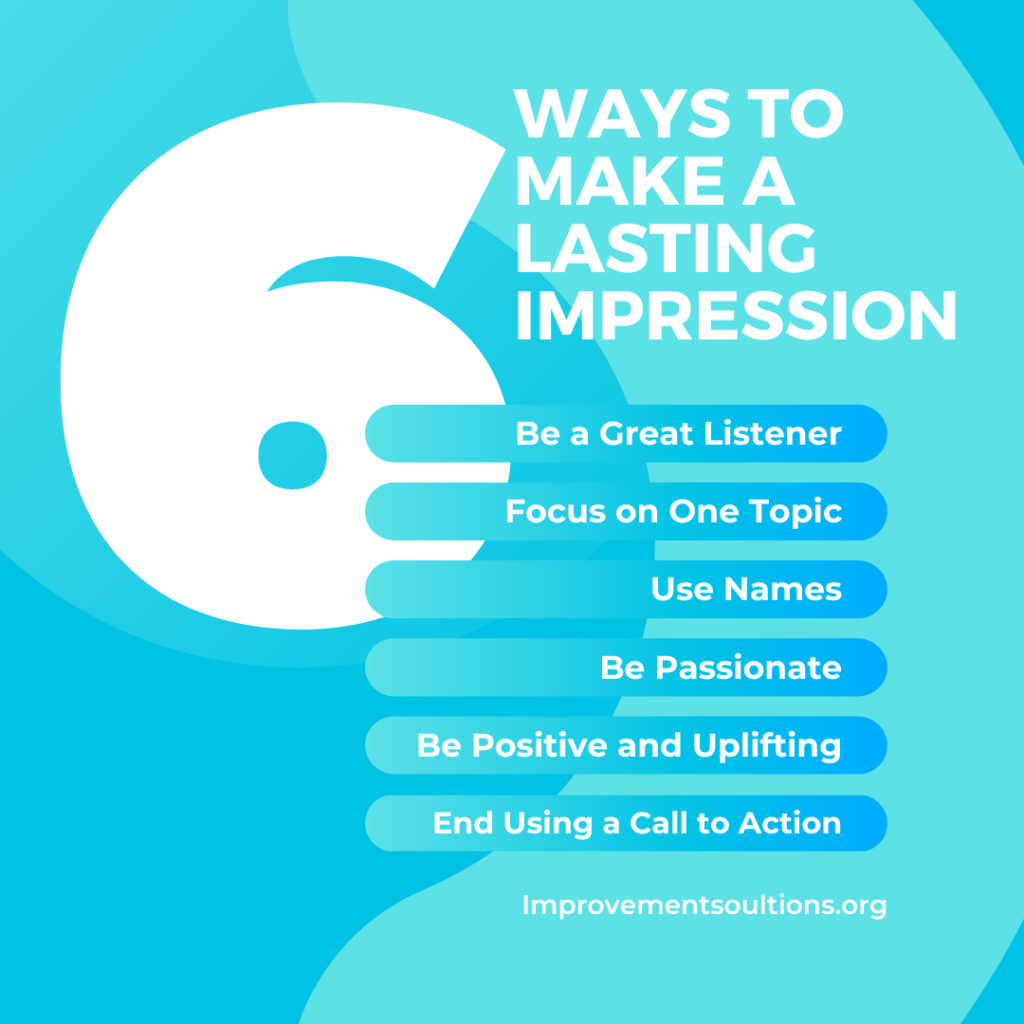How many times have you given a presentation or gone into an interview agonizing over the perfect line to say in order to be the person who shines brightest.
Or are you the type of person who practices in the mirror before talking to someone new?
If you relate to any of these, you’re in the right place.
Today you’ll learn how to make a lasting impression and be memorable.
Let’s get to it!
Why is Being Memorable Important?
Do you feel like your contributions are dismissed or forgotten after team meetings?
Do you feel like you’re being overlooked for job offers because you don’t stand out in interviews?
When asked questions, are your answers too generic or forgettable?
These scenarios are often all too common in our everyday lives. We seem to fall into the crowd and can’t shake ourselves out.
Then we look over and see those charismatic people who seem to make friends with everyone they meet.
Those connections can make a real difference in the professional world.
How is it that some people stand out while the majority of us are feeling stuck in the crowd?
Being memorable is one of the most underrated skills nowadays.
Making a lasting impression can be the difference maker between getting that job you applied for.
Standing out from the rest can also make a difference in the opportunities you have in front of you.
Imagine how your life would look if you could be a little more memorable, if you were the person that sticks out in others’ minds.
You would be able to get that job. Your ideas would be put into action. And most importantly you would be able to make those vital connections.
What Makes a Person Memorable?
Many of our clients have talked to us about crafting a perfect line that will stick in people’s minds.
This is a typical approach most people have: If I just get the right wording, then I’ll be memorable.
However, does it actually work?
In my experience: sometimes.
This approach tends to be most effective when you are giving a presentation or a speech, especially when you want the opening and concluding lines to stand out.
However, in my experience, this doesn’t always have the same effect in conversations.
I usually see one of two things happen using this approach in conversations:
- The people remember your line more than they remember you
- Your line comes across as staged or forced
Now, I will never be the one to tell you not to use a clever line. Oftentimes, they liven up the conversation, and you should use them.
But there is a much better approach to actually making an impression.

What Makes an Impression?
Now you might be wondering, if having a clever line isn’t the best way for ME to make an impression, then what is?
This is the right place for you.
The best way to make an impression—a good impression, that is—doesn’t have so much to do with what you say, but how you make people feel.
Let me tell you one of my favorite stories to put this into perspective.
Benjamin Disraeli and William Gladstone were political rivals in Britain in the late 1800’s.
Early on in their careers (when they were both single) they happened to go on dates with the same young lady.
A short time after, a reporter asked the lady about her impressions of each of them.
The lady responded: “During our time together, Gladstone convinced me that he was the cleverest person in England. But Disraeli made me feel like I was the cleverest person in England.”
We can definitely relate to this experience today.
How many times have you had a conversation where the other person has made you feel like they were the smartest person in the room?
Conversely, how many times has someone else made you feel like you were the smartest person in the room?
Who would you rather be around?
Most of us would much prefer the company of someone who makes us feel special.
As it turns out, Gladstone had spent most of the night talking about himself and his accomplishments.
Disraeli spent his time focused on her.
The message of this story still rings true today: It’s not what you say; it’s how you make people feel that leaves the biggest impression.
What Mistakes Do People Commonly Make While Trying To Be Memorable?
We addressed one common myth earlier about what makes someone memorable: creating a clever line in advance.
Let’s dive into some other common myths or mistakes people make while trying to be memorable.
Myth 2: Talking more makes you more memorable
The common belief is that the more you say, the more people will remember you.
This is actually false. Studies have found that most people will stop listening to a presentation after the 10 minute mark.
Quality, not quantity, is what matters most in conversations.
Myth 3: To stand out, you need to be the funniest person in the room
Humor is an amazing tool that you should absolutely use in your conversations. However, when people try too hard to be funny, it’s easy for their jokes to come across as forced.
Therefore, I encourage my clients to use humor that comes to them at the moment.
While practicing jokes may work for stand-up comedians, they often don’t work as well for everyday people.
Comedians have the advantage of testing their jokes hundreds of times before they hit the stage to make sure their humor seems natural.
Myth 4: Oversharing personal stories builds connections
Sharing a personal story is a great way to build connections with people.
However, this should be used in moderation.
Oversharing can be overwhelming for the other person and make them uncomfortable.
Balancing your personal stories with the other person’s interests and topics will lead to a more positive interaction overall.
Myth 5: Agreeing with everyone will make people like you, which will make you more memorable
While we don’t want to debate at every turn, people do respect authenticity.
Offering a different perspective can make you stand out more than going along with the crowd.
Myth 6: The more facts you know, the better
Sharing facts can be a great way to back up your opinions or share how much you know.
However, it’s easy to overload people with too much information.
Reciting too many facts on a topic can actually have negative effects, including reducing the ability to focus on the most significant concepts and messages.
Relating to someone’s emotions will lead to better outcomes than rattling off a list of facts.

How to Make a Lasting Impression and be Memorable
We’ve talked a lot about the misconceptions and wrong ways to go about making a lasting impression.
But what are ways we can be more memorable and make that lasting impression we are looking for?
Here are some tips that deliver just that:
1. Be a great listener
In the story earlier, Disraeli succeeded by listening. By making the focus more on the lady and not himself, he made her feel like the smartest person in the room.
When we listen to others, they feel heard. In turn, they often remember and have positive feelings towards those who truly listened to them and made them feel important.
2. Focus on one topic at a time
If you are anything like me, it’s natural to switch the topic in a conversation when a new idea pops up in your mind.
While it’s good to switch the topic from time to time, bouncing around from one topic to another can often be hard to follow.
Therefore, finish the topic at hand before changing to the next one.
3. Use names
Did you know that studies found the human brain reacts differently when it hears our name than it does for any other words.?
Hearing our name connects to the part of the brain correlated with our sense of self, our identity.
When you say someone’s name while talking to them, you trigger this powerful cognitive response.
Since saying someone’s name triggers unique reactions, the person is more likely to pay attention and feel connected.
4. Be passionate about what you discuss
Passion is contagious!
Studies have found that when a leader demonstrates enthusiasm or passion, it spreads to their team.
You can be more memorable and inspire others if you are inspired yourself.
Try and talk about a topic that inspires you or plays a meaningful role in your life.
5. Be positive and uplifting
This tip aligns with the last one. People want to be surrounded by positivity. Thus, strive to encourage people.
You can do this by giving a sincere compliment, celebrating others, and offering encouraging words during your conversations.
People remember how you make them feel.
6. End using a call to action
Ending with an actionable step will help keep you on someone’s mind.
You can do this by
- Inviting them to catch up again
- Sharing a resource
- Requesting feedback

Do These Tips Actually Work?
Even after hearing the science behind these tips, you might be wondering: Do these tips actually work?
Yes, they do!
Here is a real testimonial from a client we have personally worked with.
“I began working with Stephanie Pittman to enhance my communication clarity and confidence, with the goal of articulating ideas more effectively in my roles as Co-Founder, Chief Strategy Officer, and CEO. Since working together, I’ve experienced significant growth. Stephanie’s tailored approach and practical strategies were instrumental in this transformation. Her expertise and supportive demeanor created a conducive environment for learning. I’ve gained a deeper understanding of effective communication strategies, which has markedly improved my ability to engage confidently in discussions. I wholeheartedly recommend Stephanie to anyone seeking to enhance their communication skills. Her dedication to helping clients achieve their goals is truly impactful.”
– Srinivas
How to Apply These Tips to Real Life
While all of these tips are useful, it’s important to pace yourself while incorporating them into your life.
If you try to implement all the tips into your next conversation, it will likely feel forced and unnatural.
For the best success, pick one or two tips that speak to you and work on steadily incorporating them in your conversations.
Once you feel like you have mastered those, then you can try a couple more.
Our communication skills are always a work in progress. We are striving for improvement, not perfection.
